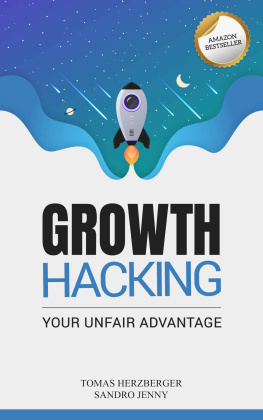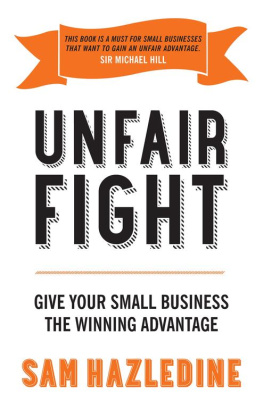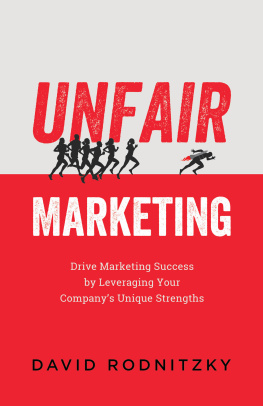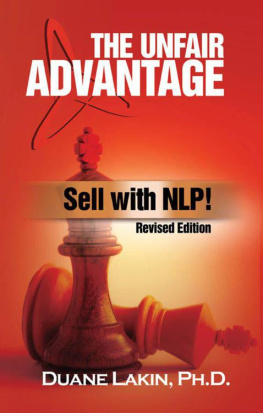The Unfair Advantage
The Unfair Advantage
How You Already Have What It Takes to Succeed
ASH ALI & HASAN KUBBA

First published in Great Britain in 2020 by
Profile Books Ltd
29 Cloth Fair
London EC1A 7JQ
www.profilebooks.com
Copyright Ash Ali, Hasan Kubba 2020
The moral right of the authors has been asserted.
All rights reserved. Without limiting the rights under copyright reserved above, no part of this publication may be reproduced, stored or introduced into a retrieval system, or transmitted, in any form or by any means (electronic, mechanical, photocopying, recording or otherwise), without the prior written permission of both the copyright owner and the publisher of this book.
All reasonable efforts have been made to obtain copyright permissions where required. Any omissions and errors of attribution are unintentional and will, if notified in writing to the publisher, be corrected in future printings.
A CIP catalogue record for this book is available from the British Library.
ISBN 9781788163316
eISBN 9781782835974
To my family (especially my mum and dad, who put up with me), my loyal friends and my cheeky daughter, Amaani.
AA
To my loving wife and family, especially my understanding parents. I love you all. Thank you.
HK
Introduction

How does a startup become so successful?
As the first marketing director of Just Eat UK, and the number 3 hire on the senior management team, I have been asked this question over and over again. After the phenomenal 1.5 billion initial public offering (IPO) of our online food ordering startup in 2014, people would ask:
Ash, you were there from the beginning. What is the secret?
My mind would spin in all different directions trying to think of an accurate answer Was it the idea? The technology? The growth hacks? The team? The timing? Maybe it was just the sheer hard work and hustle that we put in? What really led to one of the largest tech startup IPOs the UK had seen in almost a decade?
We were touted as an extraordinary London-based success story (launched originally in Denmark), and we got a lot of attention. However, every answer I gave about the cause of our success felt as if it was missing a crucial piece of the puzzle and I could never quite put my finger on it.
The beginnings of a theory for startup success began to brew in the back of my mind as I moved on from Just Eat and started a few other companies: first founding my own fully bootstrapped (without external funding or investment) startup called Fare Exchange, a private hire taxi platform, then venturing abroad to start Washplus, an on-demand mobile laundry app the first of its kind in Dubai.
With Fare Exchange, we developed smart software and digital marketing systems that took taxi bookings which were then serviced by local taxi companies. This was in 2010, years before Uber entered the scene. I grew it at blinding speed, from 0 to 25 million in bookings revenue in just three years with only five full-time staff. My next startup, Washplus, became Dubais fastest-growing laundry and dry-cleaning startup.
I developed the reputation for being a growth hacker, someone whos good at growing a startup really, really fast. Meanwhile, with the hard-earned money Id made from my own startup ventures and especially the big Just Eat IPO, I also became an angel (individual) investor and advisor, putting my own money on the line by investing in startups and mentoring them.
Ive recently started a social impact adult education startup, Uhubs, where the goal isnt just profit; rather its both profit and positive impact on society. At Uhubs we help people upskill and learn directly from experts in an easy and affordable way.
As my work with startups took me all around the world, from Europe to America, the Middle East to Southeast Asia, I kept thinking about the underlying secret to success in starting businesses. I noticed that founders and investors the world over were running into the same issues and asking me the same questions. Everyone I met was working really hard, but some startups were succeeding while others were failing.
The lie of meritocracy
If I have learned anything on my entrepreneurial journey, it is that the media narrative on startup success can be very misleading. Around every corner, youre bombarded with endless myths, hero-worship, PR, and hype around successful entrepreneurs who are heralded as living testaments to the power of hard work, meritocracy and the American Dream. (Yes, even in the UK and in much of the world in general.)
Silicon Valley and the startup world loves to present itself as a progressive, meritocratic place with those talented and hardworking enough inevitably rising up above the parapet and reaping the rewards for all the blood, sweat and tears they have put in.
Meritocracy means that those who merit it are the ones who achieve it. In other words, those who deserve to get rich, get rich.
The underlying idea is that we can all be like those amazing billionaire entrepreneurs, if only we pulled our socks up. If only we got up at 4am and hustled hard enough. We read articles and watch news segments about their tips and tricks for success, we read books that tell us we can all be like them if we were simply disciplined enough, hardworking enough, and had enough grit and perseverance.
Bullsh*t.
At a time when inequality is at an all-time high, and as someone whos made it and can now be considered very privileged, I want to relieve us of the collective delusion that were living in an actual pure meritocracy.
Because, over my two decades in the startup game, I have begun to see distinct patterns emerge as to which startups succeed and which ones fail. And Im ready to answer that question: How does a startup become so successful?
In this book, Hasan and I want to break down the factors of success in a way thats both eye-opening, brutally honest, yet still ultimately empowering.
Yes, as a society we have made leaps and bounds in becoming more meritocratic and fair, and thats fantastic. As the son of immigrants who grew up poor in the poorest part of Birmingham, I am grateful that we no longer live in the Middle Ages, when you were either a rich lord or a poor peasant.
However, my experience in the startup scene tells me that we still have a long way to go. The reality is that there are still problems, barriers and un-level playing fields too numerous to count.
As an insider whos been on all sides of the table from poor to privileged, from employee to entrepreneur, startup founder to angel investor, and mentee to mentor Im more convinced than ever of the fact that the path to success is not just self-discipline, belief and hard work.
My co-author Hasan and I see it every day plenty of hardworking, dedicated, passionate startup founders come to pitch to us at our central London office. Unfortunately, we have to turn away almost all of them and point them in a new direction.
Why? Often its because they dont understand a simple truth. A truth which defies almost every book title or business headline you see today:
Success in the startup world is not simply awarded to the hardest workers. It is awarded to those who develop and use their Unfair Advantages.
By unfair advantage we do not mean an unethical or illegal advantage (although were sure there are many of those). An unfair advantage is a competitive upper hand, and your set of unfair advantages is unique to you. Its more than just a unique selling point, its a fundamental leg-up over the competition, and sometimes its not one that is earned or worked for.
Next page










